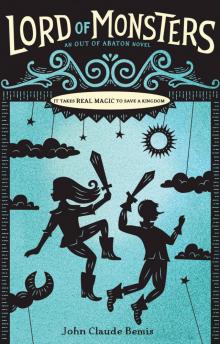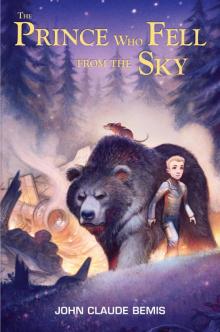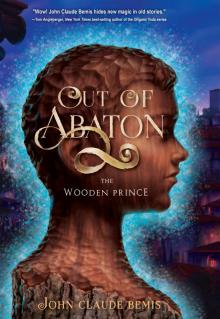- Home
- John Claude Bemis
The Wolf Tree Page 16
The Wolf Tree Read online
Page 16
“We have to, Ray! Didn’t you hear Water Spider? The Wolf Tree can help the Cherokee. It can help all the tribes. These rougarou can lead people to a world where the old ways are respected. I want to help them. I want to help them reach this place of peace.”
Marisol leaned forward. “Look, I made a promise to Nel. Ray and I are supposed to investigate Omphalosa and return to Shuckstack to tell him what we’ve discovered. Not solve lost Indian legends.”
“This is no legend!” Redfeather shouted. “You don’t believe Water Spider.”
Javidos hissed from her lap, but Redfeather ignored his threats.
“I believe he met these rougarou,” she said. “But that was a long time ago. There could be a million other reasons they’ve disappeared. And how do we know they have anything to do with the Darkness?”
Redfeather said, “Because Water Spider said—”
“Look,” Ray interrupted. “Water Spider might be right. There might be a connection. Let’s go to Omphalosa first. It might help us understand what’s happened to the Wolf Tree.”
“But Nel said for us to return afterward,” Marisol argued.
Ray frowned as he tied off the last stitch. He tossed the small pouch—no bigger than a coin purse—to Marisol. It had a long cord for her to wear Nel’s protective charm as a necklace. Ray gave the second to Redfeather, and slipped the last back into his red flannel toby.
Redfeather leaned forward, speaking urgently to Ray. “If we don’t discover the source of the Darkness in Omphalosa, will you go with me?”
“We promised Nel,” Marisol said.
Redfeather snapped at her, “You go back to Shuckstack! We don’t need you.” And then he said to Ray, “Why did you bring her anyway?”
Marisol flung Javidos onto her shoulder and stormed out of the cabin. Ray watched the door slam. “What’s the problem with you two?”
“There’s no problem.”
Ray raised his eyebrows.
“You know how she is,” Redfeather said. “She’s spoiled. She thinks everyone is beneath her.”
“She’s not like that … not anymore. We have to work together.”
Redfeather rolled his eyes. “If I try to be nice to her, will you help me find the Wolf Tree?”
Ray looked down at his toby. It felt so empty without the weight of the rabbit’s foot. He had to find the source of the Darkness if he was going to at last track down the Gog’s Machine.
“I’ll help you. But first we go to Omphalosa.”
The sun was breaking over the trees when Ray, Marisol, and Redfeather gathered their belongings and prepared to leave. Water Spider waited for them by the garden, holding the reins of two horses.
Marisol had left her valise with Little Grass as a thank-you for the new clothes. She shouldered a leather satchel as she came forward to rub her fingers into the dappled silver fur on the roan’s chin. “He’s beautiful.”
“That’s Unole,” Redfeather said. “He belongs to Mulberry. I promised we’d take good care of him. This one’s Atsila. She’s mine.” Atsila was a golden palomino, a hand smaller than Unole, but she looked strong and fast. Redfeather climbed onto her with an easy slide, dropping an iron-headed tomahawk into his belt and taking up the reins.
“I don’t care much for horses,” Ray grumbled, looking up warily at Unole.
“Oh, you just don’t know how to ride,” Marisol said, jumping to the roan’s back. She offered her hand to help Ray up. “I’ll lead him.”
Ray sighed and hopped unsuccessfully several times before getting on behind Marisol. B’hoy glided overhead, his caws remarkably close to laughter. “Shut up,” Ray murmured.
After bidding Water Spider and Little Grass farewell, they set off northwest toward the Verdigris River.
As they journeyed that first day through the pine forests north of the Indian Territory, Ray turned his attention again to trying to see through B’hoy’s eyes. Riding behind Marisol, Ray closed his eyes and searched out for B’hoy.
An image flashed before Ray’s eyes. He was high over the earth. The forests and hills swam below him. B’hoy banked and Ray gasped at the dizziness, losing his balance. As he slipped from the horse, Marisol reached out to catch him, grabbing his arm, but she tumbled to the ground on top of him.
Redfeather pulled back on Atsila’s reins. “Are you okay?”
Marisol and Ray laughed in a heap. “Get off me.” Ray pushed.
“What happened?” she asked, getting to her feet.
“B’hoy. I saw through his eyes again. But I couldn’t hold it.”
Marisol remounted and waited for Ray to get back on. Just as Ray got his foot up, she shook Unole’s reins and Ray danced a step before falling again.
“Come on, Ray,” she teased. “It’s like hopping on a train.”
“What would you know about that?” Ray laughed as he caught the back of the saddle and pulled himself behind Marisol.
“Quit joking around,” Redfeather growled.
Marisol turned, the smile still on her face. “Why don’t you use your medicine man powers and conjure a sense of humor.”
Redfeather tried to mask his frown. “It doesn’t work like that … besides, I have a sense of humor.”
Two days of journey, and the forests were no longer the endless sea of trees. Ray kept trying to see again from B’hoy’s eyes, but for whatever reason he had trouble making the link. On the third day, they crested a hill to view with awe the expansive prairie. Clusters of trees clung here and there, marking creeks and rivers, but the country stretched wide and open to the horizon and was dominated by an enormous sky.
And ahead, in the distance, they saw the Darkness.
At first the Darkness appeared as an intense band of storm clouds, a sliver of shadow far away. But as they rode further, it became clear that these were not storms, for there were no clouds. It was as if some gigantic shears had cut away the blue fabric of the sky, exposing the blackness of night beyond. Except there were no stars. No moon. Nothing but emptiness and dark.
Each day, the sun rose later and set earlier. It was disorienting, like winter was racing forward in time at a pace of a month each day. The weather grew winterlike as well, and Ray worried that they might not have brought adequate clothing for the cold. The prairie grass and earth soon crunched beneath the hooves of the horses. Rivers became edged in ice, and the trees on their banks were bare, some of them dead from their long dormancy.
When they forded the Smoky Hill River a week later, the sun disappeared for the last time. Darkness, oppressive and complete, closed around them.
They camped when they were tired, slept a few hours, and not knowing day from night, broke camp after a time and continued. Redfeather carried cinders from the campfire in a tin-lined box. Holding a cinder, he could envelop his hand in flames. It only illuminated a few dozen yards in any direction, but it was enough light to guide their way.
Ray was used to listening for animal noises. But there were none. No howling coyotes or deer snorts or birdcalls of any kind. Only the whipping wind whistled against their ears.
“I’m going to lose this hat,” Ray grumbled, catching ahold of the brim before it blew from his head. Shivering, he pulled his collar tighter around his neck and adjusted his legs to try to find a more comfortable way to sit behind Marisol.
B’hoy beat his wings as he gripped his talons tighter to Ray’s shoulder. The crow, unable to see anything from the air, had given up flying.
Abandoned homesteads appeared every so often like ghosts on the empty prairie. Ray thought of the travelers he and Marisol had seen in Missouri, Jayhawkers desperate to escape the Darkness. He could see why they had left. Who could stay in the oppressive dark?
Then he remembered the travelers burying their dead by the roadsides in Missouri. How strange—now that they had entered the Darkness—that they saw none of the hastily dug graves.
When Ray mentioned this, Redfeather whispered, “We haven’t seen anything living in days eith
er.”
Redfeather spread a map against Atsila’s neck and nearly lost it to the vicious wind. Since they were unable to see the landscape around them, their travel had been slow. Marisol brought Unole close to Atsila’s side and reached over to help Redfeather hold the map. Redfeather cupped his flaming hand near the map to read it.
“Well?” Ray asked, leaning around Marisol’s back to see.
Redfeather ran his fingers along the tattered paper. “That was the Saline River we crossed earlier. We should be there.”
“Maybe we missed it in the dark,” Marisol said. She stroked Unole’s ears to calm him.
“A whole town?” Ray asked.
Redfeather folded the map and peered out at the blank Darkness. “It’s possible.”
A few hours later, a glow formed in the distance. They traveled toward it, fear growing in their hearts. When at last they reached the top of a rise, they saw that they had reached Omphalosa.
The windows of buildings were lit, outlining a single main street nearly a quarter of a mile long. Beyond the western edge, an enormous factory reared over the small town like some predatory beast. Half a dozen smokestacks belched great clouds, glowing with otherworldly flame. The illuminated smoke formed a sort of canopy, reflecting its light across the large brick buildings.
A fence encircled the entire factory except for two entrances. One led to the town; the other to train tracks stretching out to the north, disappearing on the dark prairie. Between the factory and town was a city of tents punctuated by campfires and the shadows of people moving about the yard.
Ray exchanged a look of worry with Redfeather.
Marisol shivered and said, “We need to buy coats and some warmer clothes. Probably extra blankets, too.”
“We’ll look for a store before finding a place to camp outside town,” Ray said.
“Okay,” Redfeather said. “But let’s try not to draw any attention. Buy what we need and get back out until we have a plan.”
Riding toward the eastern edge of the town, they crested a hill crowned with a solitary tree. A gasoline torch was speared in the ground beneath the tree and something hung from the tree’s branches: all shadow and creaking rope. As the horses passed the tree, Ray gasped.
An elderly black woman, open-eyed but dead, dangled from a noose. In the oily light of the torch, Ray read a sign pinned to the old woman’s tattered dress.
“Witch.”
Nausea welled up in Ray’s throat. Marisol began breathing heavily and trembling. Ray leaned closer to her back, tightening his grip around her waist. “Look away,” he whispered. Redfeather slid his hand down to rest on his tomahawk as he shook Atsila’s reins to hurry from the tree.
“Keep a distance,” Ray said to B’hoy. “A crow might seem a little out of place.”
B’hoy swept from his shoulder, circling the horses before flying ahead to perch on the shadowed far end of a corral’s split rail fence. The corral marked the eastern entrance to the solitary street leading down Omphalosa. Skittish, snorting horses clustered together in the pen. Ray cast one horrified glance back over his shoulder before facing the town.
Riding down the street, Ray felt some relief that they drew little notice. The town was swarming with all manner of people. Most were immigrants—Chinese, Italians, Russians, and others Ray could not recognize—who Mister Bradshaw had said were brought in as workers for the mill. They moved about with the tasks of ordinary townsfolk: shopping, speaking together, coming in and out of homes and buildings. But their movements were strangely stilted. Ray could not place what was odd about them, but these ashen-skinned people unnerved him.
The horses kept to a slow pace, often stopping in the thickest crowds. The thoroughfare was illuminated by kerosene torches mounted on the porch rails of each building.
Ray and Marisol rode beside Redfeather past the saloons, shops, and offices. A store advertised “Johanson’s Haberdashery: Gents’ Clothing—Boots—Tobacco—Supplies.” Stopping here, they tied up the horses. Redfeather kept a cautious eye to the street. “I’ll watch the horses while you two go get blankets and coats.”
Ray and Marisol stepped onto the planked sidewalk, where the strange townsfolk moved away from them with wary glances. Marisol nodded to a line of pine coffins propped in a grim display against the front of another store. “A furniture store selling coffins?” Marisol whispered.
“Not a good sign, is it?” Ray replied as they went into the haberdashery.
A man behind the counter asked if he could help them as they came through the door. The shop was empty but for the sallow-faced shopkeeper.
“We’re in need of warmer coats,” Ray said. “Blankets, too, if you have them.”
The man nodded with an expressionless face. “Over there.” He pointed to the far wall.
Ray followed Marisol past racks and displays of boots, shirts, coats, and hats of only the most functional designs. They tried on a few pairs of heavy, wool-lined frock coats before selecting three. Marisol grabbed the blankets and they headed to the counter.
As the shopkeeper tallied up the cost, Ray stared at the man’s hands. They were pale gray, much like Mister Bradshaw’s skin. But this man did not seem sick. He was not coughing.
“Eight-fifty,” the shopkeeper said with a dull voice.
Marisol paid him from her coin purse, and they hurried out the door with the bundles in their arms.
They met Redfeather and began putting on the coats. As Ray rolled the blankets and tied them to the back of Unole’s saddle, Redfeather asked, “What’s going on over there?”
Ray came around Unole and looked across the street. A burly man in a woolen cap snatched an envelope from a boy before shoving him down into the mud. Several other men, pitiless and dark-eyed, watched from the sidewalk. Passersby did little more than glance down at the boy before moving on.
“I don’t know,” Ray murmured.
The boy sprang to his feet and rushed at the burly man, clambering for the envelope that was held from his reach. “Give it to me! Give it back!”
The man shoved the boy back again. “I done told you, you little wop.”
One of the men on the sidewalk said, “That boy runs letters for the Pinkertons, Gatch. I wouldn’t mess with him.”
Gatch snarled over his shoulder, “Well, his pa owes me five dollars lost fair in a hand of poker. Been two weeks, and he ain’t paid me yet.”
“I don’t have five dollars,” the boy pleaded. “But I can pay you later. Please, just give me the telegram. It’s for Mister Muggeridge.”
Gatch looked hesitantly at the envelope in his hand. Then he reached down and grabbed a rusty chain from the boy’s pocket, pulling out a tattered watch.
He dropped the envelope as he snatched up the watch. “I’m hanging on to this then,” Gatch growled. “Run, get that money from your pa, and I’ll give it back.”
“But Mister Muggeridge. He gave me the watch. I need it for my errands.” The boy clawed at Gatch’s coat, until Gatch grabbed the boy by the back of the neck, squeezing until the boy dropped to his knees, pleading and crying out in pain.
“He needs help,” Ray muttered.
“What are you going to do?” Marisol asked.
Redfeather put his hand on Ray’s shoulder to stop him. “I don’t like it either, but see all those men on the sidewalk?”
“I see them.” Ray turned to step back up to the line of coffins displayed before the furniture store. With the blunt end of his knife, he pried out a nail. He strode across the street toward Gatch and the boy. As he did, he sent his thoughts out to B’hoy. The crow was there in a moment, settling on a rooftop.
The boy was beating his hands helplessly against Gatch’s grip. The burly man squeezed harder, shouting, “You had enough? You going to get that money now?”
Ray stopped before Gatch and said, “I’ve had enough. Let go of that boy.”
Gatch looked at Ray. His snarl melted into a smile of savage mirth. His gray skin and black eyes ga
ve him the look of something dangerous and wraithlike. “What you got to say about it?”
“Give the boy back his watch.”
The other men on the sidewalk stepped forward with interest. Out of the corner of his eye, Ray saw Redfeather and Marisol moving around to the sidewalk, positioning behind the men.
Ray guessed Gatch to be three hundred pounds or more. He had no chance of overpowering the man normally. But a root doctor, who had lived for a time on the rough streets of Baltimore, had shown Ray a spell he used to even the odds in a fight.
“And what if I don’t?” Gatch sneered, and drew a knife from his belt.
B’hoy launched from the rooftop, knocking Gatch’s cap from his head and clawing and pecking at his face.
Ray lunged forward and knocked the knife to the ground. He grabbed Gatch’s hand, twisted his arm behind his back, and pierced the calloused skin of his palm with the coffin nail.
One of the men on the sidewalk drew a revolver and fired it in the air. B’hoy took flight, cawing and cursing his way back to the rooftop. The man brought the revolver around to aim at Ray.
Ray pulled tightly on Gatch’s arm, securing it against the man’s wide back. Gatch was pitched forward, with Ray locked at his side. The big man did not struggle—he could not struggle. “Tell that man to put away his gun,” Ray said.
Gatch grunted but did not reply. Ray punched the coffin nail a little further into his hand. “Tell him!” Ray said.
“Put that gun away, Curtis,” he called.
The men on the sidewalk blinked in confusion. “He’s bewitched Gatch,” one of the men hissed. Curtis continued to hold the revolver outstretched. Another man growled and stepped from the porch, drawing a derringer from his coat pocket.
Redfeather appeared beside him and reached a hand out to a kerosene torch mounted on the porch. He extinguished the torch in his palm. Redfeather turned to face the man, flames glowing vaporously from his clenched fist. “Drop your gun.”
The man stared a moment at Redfeather’s hand, but then he raised the derringer. Redfeather wheeled around with his tomahawk, clipping the barrel before the gun fired and throwing the little derringer into the air. He flicked out his other hand as if lashing a whip. A tongue of flame sprouted from his hand, catching the man’s pants leg on fire.

 The White City
The White City Lord of Monsters
Lord of Monsters The Prince Who Fell from the Sky
The Prince Who Fell from the Sky The Nine Pound Hammer
The Nine Pound Hammer The Wooden Prince
The Wooden Prince The Wolf Tree
The Wolf Tree